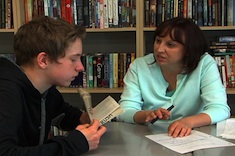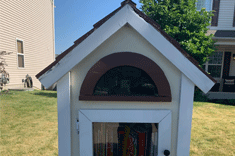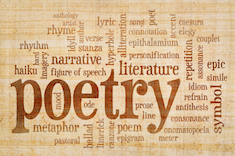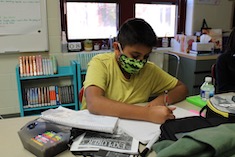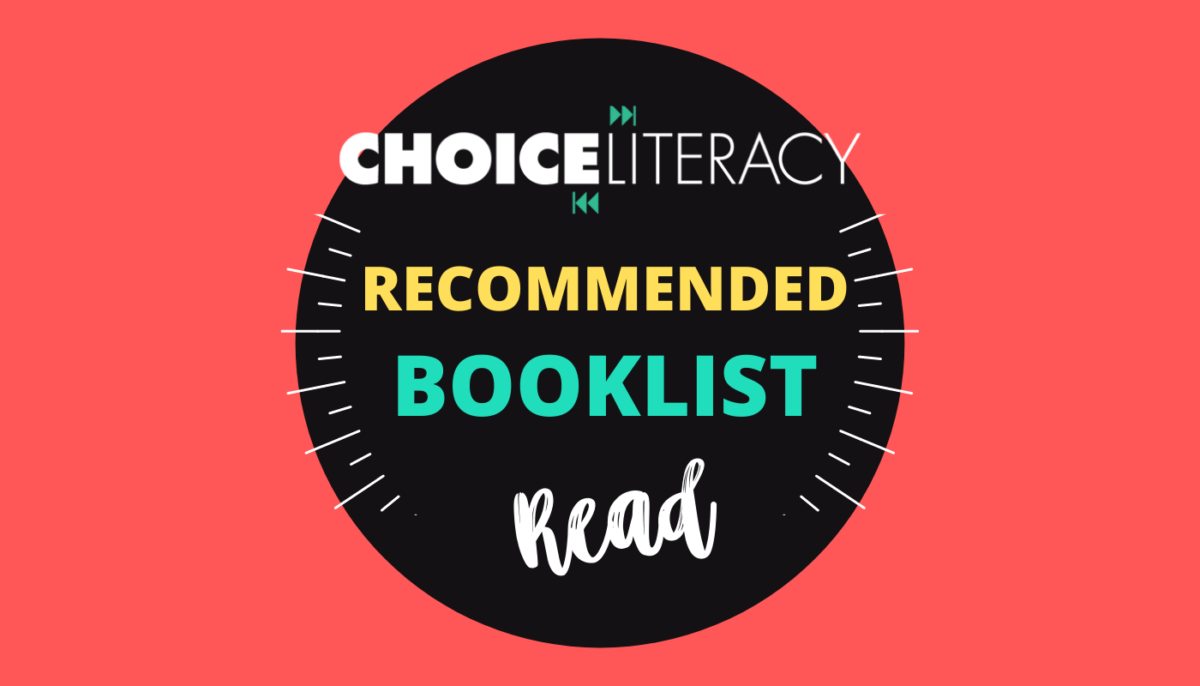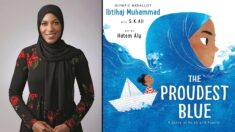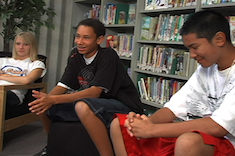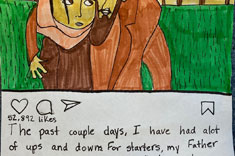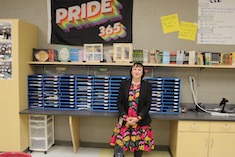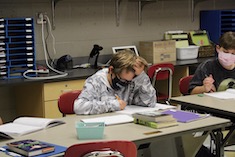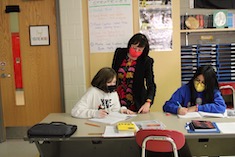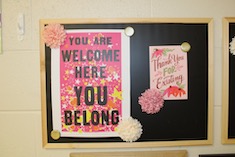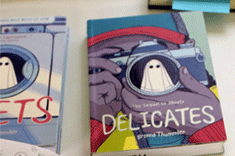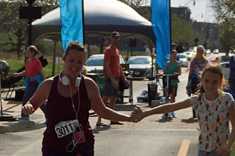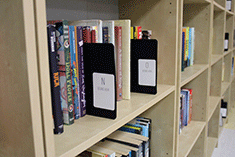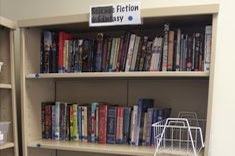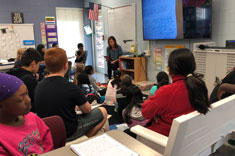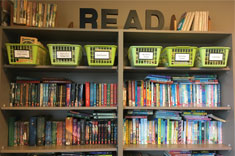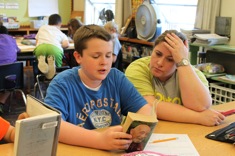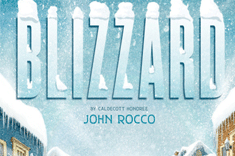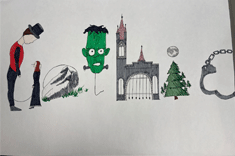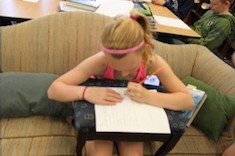9th
Latest Content
Making Time for Poetry
Gretchen Schroeder encourages teachers to make time for the things that are important. For her, it was poetry, and she outlines how she created a weekly poetry ritual in her high school classroom that enhanced the curriculum.
Reading Threads
Christy Rush-Levine guides us to make reading recommendations based on what students enjoy most about a book they recently read. Christy used to make recommendations based on the genre or topic, but she has learned to listen to students to discover the reason they loved a recent read and use this information for recommendations.
Making Queer Inclusivity Less Complicated
Gretchen Schroeder intentionally uses tried-and-true instructional practices to increase the inclusivity of texts and topics in her high school English class.
What Matters More
Dana Murphy shares that by asking “What matters most?” she can make decisions that allow her literacy instruction to be student-centered and authentic.
Using Daily Attendance Questions to Build Community and Communication Skills
Gretchen Schroeder is surprised to find benefits of a stronger community and communication skills through a practical attendance routine in her high school classroom.
Poems to Start the Year
Tara Barnett and Kate Mills share poems to start the year that touch a variety of needs, from building community to connecting with colleagues to hosting parents for back-to-school night.
Honoring Student Identity (Download a Survey)
Tara Barnett and Kate Mills share their authentic process for expanding their beginning-of-the-year student survey to make it more open for all students.
Bring Me Something Funny (Booklist)
Cathy Mere offers a booklist in response when a teacher asks her to “Bring me something funny.” These books are sure to fill your classroom with lighthearted laughter.
Using The Proudest Blue in the Classroom
Tara Barnett and Kate Mills share three ways using The Proudest Blue by Ibtihaj Muhammad empowers and strengthens readers in all grades.
Interpreting Figurative Language
Tara Barnett and Kate Mills step us through an intentional process to help students understand and interpret figurative language. Using Long Way Down by Jason Reynolds as a mentor text, Tara and Kate give students the skills and confidence to find deep meaning in texts. Download an Interpreting Figurative Language chart to support your students in learning to interpret figurative language.
Take a Chance
Julie Cox invites us to take risks in order to encourage students to try new things with their writing and reading. Julie concludes that when teachers are professional risk-takers, we are more available to students and know how to help them when they fail.
A Perfect Opportunity for Choice: Showing Theme
Tara Barnett outlines ways to offer choices for students to show their understandings of a book’s theme. Download a choice board and rubric.
Quick Take: Using Mailboxes for Private Feedback
Christy Rush-Levine shares her system for streamlining passing papers and offering a place for private feedback.
Using Images for Rehearsal in Persuasive Writing
Melanie Meehan makes a case for the power of pictures to provide a foothold and access point for students to enter the writing pathway. She shares an example of using images to engage in persuasive writing strategies.
Opinions! Everybody Has One
Leigh Anne Eck shares a tool to help students develop their persuasive voices, build community, and expand their perspectives. Included is a download to put opinion journals to work in your classroom.
Honoring Student Choice in a Teacher-Chosen Text
Tara Barnett and Kate Mills offer practical and engaging choices to students when reading a teacher-selected whole-class text. Download the reading choices survey and a sample pacing calendar to offer your students more choice during a whole-class read.
What Criteria Should We Use When Selecting Whole-Class Texts?
Christy Rush-Levine reminds us that text selection affects students. By shaping a unit of study to contain texts of varying formats and representing a wide variety of characters, students are empowered to develop their own ideas even while reading a whole-class text. Download a diverse text list to deepen a discussion of how family shapes identity.
Tips for Selecting Inclusive Texts
Hannah Tills and Josie Stewart challenge themselves to select more inclusive texts so all students feel as though they belong. They offer six suggestions to help us examine our bookshelves, thinking, and curriculum.
Book Talk: Sheets and Delicates by Brenna Thummler
Christy Rush-Levine pairs Brenna Thummler’s books Sheets and Delicates in a book talk for her sixth-grade class.
The Reluctant Marathoner: Reflecting on Student Engagement
Gretchen Schroeder uses her reluctance as a marathon runner to reflect on how to encourage more engagement in reading and writing.
Quick Take: Simple Classroom Library Organization
Christy Rush-Levine shares her simple system for organizing her massive classroom library.
Leading Students Toward Underused Sections of the Classroom Library
Gretchen Schroeder intentionally leads students to “jilted genres” in her classroom library.
Formative Assessment From Share Sessions
Ruth Ayres outlines different kinds of share sessions and different formats for the share, including some that take advantage of technology.
Expanding Book Choices for Secondary Readers
Ruth Ayres challenges us to be more open to the books that live in our secondary classroom libraries. She contends that committing to supporting choice in independent reading means rethinking some of the restrictions we put on adolescent readers.
Reading Quiz
Gretchen Schroeder shares the way she adjusts her reading quizzes to assess students’ analysis and deep thinking about texts.
Learning to Notice and Analyze Complexities
Gretchen Schroeder supports her high school students to think deeply about the complexities around them, beginning with themselves and pop culture, and then moving to the texts they are reading.
Finding Time for Read Aloud
Katherine Sokolowski makes a case for the importance of reading aloud to secondary students and offers suggestions to make it a reality. She includes a list of five surefire read aloud books for middle school students.
Picture Books to Teach Conflict
Katherine Sokolowski shares a book list that inspires her to teach five different kinds of conflict.
Three Meaningful Ways to Incorporate Drawing into English Class
Gretchen Schroeder shares three meaningful ways to incorporate drawing into her high school English classes, and the purpose behind each strategy.
Combining Personal Narratives and Comics
Katherine Sokolowski combines personal narratives and comics to encourage students to go deeper in their storytelling.
Browse Content By
Type
Category
- Assessment Tools
- Big Fresh Archives
- Booklists
- Choice Numeracy
- Classroom Design
- Common Core
- Community Building
- Conferring
- Content Literacy
- Digital Literacy
- English Language Learners
- Equity
- Family Relations
- Free Samples
- Guiding Groups
- Leadership
- Literacy Coaches
- Mentor Texts
- Minilessons
- New Teacher Mentors
- Podcasts
- Poetry
- Quote Collections
- Reading Strategies
- Self Care
- Struggling and Striving Learners
- Talking and Listening
- Teacher Study Groups
- Teaching Reading
- Teaching Writing
- Word Study and Vocabulary
Author
- Melissa Quimby
- Nawal Qarooni
- Gwen Blumberg
- Julie Cox
- The Lead Learners
- Hannah Tills
- Josie Stewart
- Ruth Metcalfe
- Mallory Messenger
- Becca Burk
- Jodie Bailey
- Vivian Chen
- Mary Brower
- Tiffany Abbott Fuller
- Stephanie Affinito
- Ruth Ayres
- Leigh Anne Eck
- Heather Fisher
- Shari Frost
- Julie Johnson
- Suzy Kaback
- Gigi McAllister
- Shirl McPhillips
- Melanie Meehan
- Cathy Mere
- Debbie Miller
- Tara Barnett and Kate Mills
- Tammy Mulligan
- Dana Murphy
- Bitsy Parks
- David Pittman
- Brenda Power
- Heather Rader
- Matt Renwick
- Mandy Robek
- Christy Rush-Levine
- Gretchen Schroeder
- Jen Schwanke
- Brian Sepe
- Katherine Sokolowski
- Stella Villalba
- Jennifer Vincent
Grade Level
Choice Literacy Membership
Articles
Get full access to all Choice Literacy article content
Videos
Get full access to all Choice Literacy video content
Courses
Access Choice Literacy course curriculum and training


